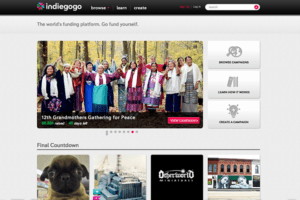Are you a budding entrepreneur looking for innovative ways to fund your business venture? Look no further than crowdfunding! In this article, we will explore the ins and outs of raising capital for your business through crowdfunding. Whether you're a startup or an established company, crowdfunding can be a game-changer in getting the financial support you need. Join us as we uncover the secrets to successfully navigating the world of crowdfunding and securing the equity you need to bring your business dreams to life. It's time to turn your ideas into reality!

Understanding Crowdfunding
Definition of crowdfunding
Crowdfunding is a financing method that allows individuals and businesses to raise capital by collecting small contributions from a large number of people, typically through online platforms. It provides a way for entrepreneurs and innovators to fund their projects, products, or services by harnessing the power of the crowd. Through crowdfunding, individuals who believe in a business idea or cause can contribute as little or as much as they want to help make it a reality.
Different types of crowdfunding
There are several different types of crowdfunding, each with its own unique characteristics and purposes. The most common types include:
-
Rewards-based crowdfunding: This type of crowdfunding involves offering backers a reward in return for their contribution. These rewards can range from exclusive access to the product or service being funded to personalized thank you notes or special merchandise.
-
Equity crowdfunding: Equity crowdfunding allows backers to invest in a business in exchange for equity or shares. This type of crowdfunding is particularly suitable for startups and early-stage companies looking for long-term investors who believe in their potential for growth.
-
Donation-based crowdfunding: As the name suggests, donation-based crowdfunding is focused on raising funds for charitable causes or community projects. Contributors do not receive any financial returns or rewards but instead contribute out of the kindness of their hearts to support a particular cause.
-
Debt-based crowdfunding: With debt-based crowdfunding, also known as peer-to-peer lending, individuals lend money to businesses or individuals and receive repayment with interest over a specified period. This type of crowdfunding is often used by borrowers who may not qualify for traditional loans.
Benefits of crowdfunding for businesses
Crowdfunding offers numerous benefits for businesses, especially startups and small businesses that may struggle to secure traditional financing. Some key advantages include:
-
Access to funding: Crowdfunding provides an alternative source of capital that may not be available through traditional lenders. This allows businesses to pursue their entrepreneurial endeavors without relying solely on bank loans or personal savings.
-
Market validation: Running a successful crowdfunding campaign can serve as proof of concept, demonstrating market demand for a product or service. This validation can help attract additional investors and build credibility before approaching traditional funding sources.
-
Increased exposure: Crowdfunding platforms have a built-in community of potential supporters who can become brand ambassadors and spread the word about your business. This exposure can generate valuable buzz and help attract new customers.
-
Feedback and engagement: Through crowdfunding, businesses can engage directly with their backers and receive valuable feedback. This feedback can be instrumental in improving products or services and building a loyal customer base.
-
Creative freedom: By relying on the crowd instead of traditional investors, businesses have the freedom to pursue innovative ideas that may not align with the preferences of traditional funding sources. Crowdfunding allows entrepreneurs to take risks and explore unique ideas without sacrificing creative control.
Preparing Your Business for Crowdfunding
Assessing your funding needs
Before diving into crowdfunding, it's crucial to assess your funding needs and determine how much capital is required to achieve your goals. Consider the costs associated with production, marketing, distribution, and any other aspects of your business that need financing. By having a clear understanding of your funding needs, you can set realistic fundraising goals and communicate them effectively to potential backers.
Creating a compelling business plan
A well-crafted business plan is essential for crowdfunding success. It serves as a roadmap for your business and provides a comprehensive overview of your goals, target market, competition, and revenue projections. When creating your business plan, focus on clearly articulating how your product or service solves a problem or fulfills a need in the market. This will help potential backers understand the value and potential of your business, increasing their willingness to support your crowdfunding campaign.
Building a strong online presence
Since crowdfunding campaigns primarily take place online, it's crucial to establish a strong online presence for your business. This includes having a professional website and active social media channels that demonstrate your credibility and engage with your target audience. Regularly update your online platforms with relevant content, interact with your followers, and showcase your expertise in your industry. Building a robust online presence will not only attract potential backers but also help create a sense of trust and legitimacy around your business.
Establishing credibility and trust
Trust plays a significant role in the success of any crowdfunding campaign. Potential backers need to feel confident that you can deliver on your promises and effectively utilize the funds raised. Establishing credibility involves showcasing your expertise, experience, and passion for your business. Include relevant achievements, accolades, or certifications in your campaign materials to build trust. Additionally, consider leveraging testimonials, case studies, or endorsements from satisfied customers or industry experts to further establish credibility.
Choosing the Right Crowdfunding Platform
Researching available platforms
With numerous crowdfunding platforms available, it's essential to conduct thorough research to find the one that aligns with your business needs and goals. Look for platforms that have a track record of successful campaigns, a user-friendly interface, and a strong community of backers. Assess the platform's reputation, user reviews, and success stories to gauge its suitability for your crowdfunding campaign.
Evaluating platform features and fees
Each crowdfunding platform offers different features and fee structures. Consider the specific features and tools that are important to your campaign, such as campaign analytics, email marketing integration, or social sharing capabilities. Additionally, pay attention to the platform's fee structure, including any upfront costs, transaction fees, or percentage of funds raised that the platform takes. Evaluate these factors to ensure that the platform aligns with your budget and campaign goals.
Considering the platform's target audience
Different crowdfunding platforms cater to different types of projects and audiences. Some platforms focus on specific industries or niches, while others have a more general audience. Analyze the demographics and interests of the platform's user base to determine if it aligns with your target audience. Choose a platform that not only provides the necessary tools and features but also exposes your campaign to the right audience, increasing the chances of attracting potential backers who are genuinely interested in your business or project.
Creating an Effective Crowdfunding Campaign
Setting realistic funding goals
When setting funding goals for your crowdfunding campaign, it's important to be realistic. Analyze the costs associated with your project, including manufacturing, marketing, and fulfillment expenses, and set a funding goal that covers those expenses without aiming too high. Setting an attainable goal increases the likelihood of reaching it and helps build confidence among potential backers. Remember, surpassing your initial funding goal can be seen as a success and generate even more momentum for your campaign.
Crafting a compelling campaign message
A powerful and compelling campaign message is essential to capture the attention and interest of potential backers. Clearly communicate what problem or need your business solves, how your product or service is unique, and why it matters. Use persuasive language that evokes emotion and connects with the audience on a personal level. Consider sharing personal stories, statistics, or testimonials to reinforce the impact of your business and create a sense of urgency for potential backers to contribute.
Creating an engaging campaign video
A well-produced video can significantly enhance the effectiveness of your crowdfunding campaign. Use the video to tell your story, showcase your product or service, and highlight the benefits and impact it can have. Keep the video concise, engaging, and visually appealing to maintain viewers' attention. Make sure to include a clear call-to-action at the end of the video, directing viewers to the crowdfunding campaign page for further information or to make a contribution.
Designing a visually appealing campaign page
The design of your campaign page plays a crucial role in attracting and retaining potential backers. Use visually appealing graphics, images, and typography that align with your brand and evoke the desired emotions. Clearly present key information, such as funding goals, rewards, and progress updates, in a visually organized manner. A clean and professional layout will enhance the credibility of your campaign and make it easier for potential backers to navigate and understand.
Offering enticing rewards for backers
Rewards are a crucial aspect of a crowdfunding campaign, as they incentivize potential backers to contribute. Create a range of reward tiers with varying contribution levels, ensuring that each tier offers a unique and valuable experience or item. Consider exclusive access to limited editions, personalized thank you notes, merchandise, or early bird discounts. The rewards should align with the contribution level and provide an enticing value proposition that motivates potential backers to support your campaign.
Marketing and Promoting Your Crowdfunding Campaign
Utilizing social media platforms
Social media platforms are powerful tools for marketing and promoting your crowdfunding campaign. Leverage platforms like Facebook, Twitter, Instagram, and LinkedIn to create buzz, engage with your audience, and share updates about your campaign. Use compelling visuals and concise captions to captivate attention and entice followers to visit your campaign page. Encourage your followers to share your posts and spread the word about your campaign to their networks.
Harnessing the power of email marketing
Email marketing can be highly effective in reaching potential backers who have expressed interest in your business or campaign. Build an email list by offering a sign-up form on your website or social media channels. Send regular updates about your campaign's progress, share exciting news, and remind subscribers of the remaining time to contribute. Personalize your emails and segment your audience to cater to their specific interests and engagement levels.
Reaching out to your network
Leverage your personal and professional network to spread the word about your crowdfunding campaign. Reach out to friends, family, colleagues, and business associates, and share your campaign's details with them. Clearly articulate why your business or project is important to you and how their support can make a difference. Encourage them to contribute and ask them to share your campaign with their own networks.
Partnering with influencers or bloggers
Collaborating with influencers or bloggers who have a strong online presence and an audience that aligns with your target demographic can significantly boost your crowdfunding campaign. Identify influencers or bloggers in your industry or niche and reach out to propose a partnership. Offer them exclusive content, early access to your product or service, or a mutually beneficial arrangement to encourage them to promote your campaign to their followers.
Utilizing PR strategies
Public relations strategies can help garner media coverage and raise awareness about your crowdfunding campaign. Create a compelling press release and distribute it to relevant media outlets, both online and offline. Offer interviews or exclusive stories to journalists who cover topics related to your industry or cause. Engage with journalists and influencers on social media to build relationships and increase the likelihood of them featuring your campaign.
Engaging with Potential Backers
Responding to inquiries and comments
Being responsive to inquiries and comments from potential backers is crucial for building trust and maintaining engagement. Promptly respond to questions, concerns, and requests for more information about your campaign. Show genuine interest and appreciation for their engagement, addressing their queries or comments in a friendly and professional manner. Responding promptly and attentively will demonstrate your commitment to your backers and reinforce your credibility.
Providing regular updates on the campaign
Keeping your backers informed throughout your crowdfunding campaign is essential for maintaining their support and engagement. Provide regular updates on the campaign's progress, milestones achieved, and any changes or developments. Share stories or testimonials from satisfied customers, highlight important contributions, and show how the funds raised are being utilized. This transparency helps foster a sense of community and trust among your backers.
Building a sense of community
Create a sense of community around your crowdfunding campaign by actively engaging with your backers and fostering a supportive environment. Use social media or dedicated online forums to encourage backers to interact with each other, share their thoughts or experiences, and even collaborate on your project. By building a community, you can cultivate a group of loyal supporters who become ambassadors for your business beyond the duration of your crowdfunding campaign.
Showing gratitude to backers
Expressing gratitude to your backers is essential for acknowledging their support and nurturing the relationship beyond their contribution. Use personalized thank you messages or emails to show genuine appreciation for their belief in your business or project. Consider offering exclusive perks or incentives as a token of your gratitude, such as invitations to launch events or access to future updates. By showing your gratitude, you can strengthen the bond with your backers and encourage them to continue supporting your endeavors.
Managing the Funding and Delivering on Promises
Tracking and managing funds raised
Managing the funds raised through your crowdfunding campaign requires careful tracking and organization. Use dedicated accounting software or tools to keep a record of contributions, expenses, and financial transactions. Regularly update your records and monitor your campaign's progress towards your funding goal. By maintaining a clear overview of your finances, you can make informed decisions and ensure the funds are utilized effectively and transparently.
Ensuring legal compliance
When running a crowdfunding campaign, it is crucial to comply with all applicable laws and regulations to protect yourself and your backers. Research the legal requirements specific to your country or region, such as the proper disclosure of financial information or compliance with securities laws in equity-based crowdfunding. Seek legal advice if necessary to ensure that your campaign is legally sound and that you fulfill all obligations to your backers.
Delivering rewards on time
Timely delivery of rewards is a crucial aspect of fulfilling your promises and ensuring customer satisfaction. Plan your fulfillment process carefully, considering production timelines, shipping logistics, and potential delays. Communicate the estimated delivery timeline to your backers and provide updates throughout the process. If unforeseen circumstances arise that impact the delivery schedule, be transparent and proactive in communicating with your backers to manage their expectations.
Maintaining open communication with backers
Open and transparent communication is key to maintaining trust and fostering a positive relationship with your backers. Keep your backers informed of any challenges, setbacks, or changes that may arise during the fulfillment process. Address any concerns or inquiries promptly and honestly. By maintaining open communication, you can build long-term relationships with your backers and establish a reputation for integrity and accountability.
Analyzing and Learning from Your Crowdfunding Experience
Evaluating campaign performance and results
Once your crowdfunding campaign has concluded, it's essential to evaluate its performance and analyze the results. Assess the funds raised compared to your initial funding goal and evaluate the engagement levels, number of backers, and conversion rates. Analyze demographic data, referral sources, and campaign analytics to gain insights into the effectiveness of your marketing and promotional efforts. This evaluation will provide valuable lessons and insights for future fundraising endeavors.
Identifying areas for improvement
Through the analysis of your crowdfunding campaign, identify areas for improvement and learn from any shortcomings or challenges. Evaluate the reasons behind the success or failure of your campaign and pinpoint aspects that could have been executed more effectively. Consider feedback and comments from your backers to gain insights into areas that may require improvement, such as product features, customer service, or communication strategies. Use these learnings to refine your business operations and enhance future crowdfunding campaigns.
Learning from successful campaigns
Studying successful crowdfunding campaigns in your industry or niche can provide valuable inspiration and insights. Analyze the strategies, messaging, and engagement techniques employed by successful campaigns to understand what resonates with potential backers. Learn from their achievements and adapt their best practices to your own business or project. By learning from successful campaigns, you can refine your approach and increase your chances of crowdfunding success.
Applying lessons to future fundraising efforts
The lessons learned from your crowdfunding experience can be applied to future fundraising efforts, whether through crowdfunding or alternative financing methods. Leverage the knowledge gained to refine your business plan, messaging, and marketing strategies. Incorporate feedback from backers and address any areas for improvement identified. Continuously adapt and refine your fundraising approach based on the learnings from each campaign to increase your chances of success in future endeavors.
Alternative Funding Sources
Exploring traditional financing options
While crowdfunding provides an alternative funding source, it's essential to explore traditional financing options as well. Consider loans from banks or credit unions, lines of credit, or business credit cards. Research government-backed loan programs or grants that may be available to businesses in your industry or location. Evaluate the eligibility requirements, interest rates, repayment terms, and other factors to determine the most suitable traditional financing option for your business.
Considering angel investors and venture capitalists
Angel investors and venture capitalists can provide substantial funding and expertise to growing businesses. These investors typically invest in startups and early-stage companies in exchange for equity or a share of future profits. Research angel investor networks, venture capital firms, or startup incubators that are relevant to your industry. Prepare a compelling pitch deck and business plan to present to potential investors, highlighting the scalability and growth potential of your business.
Applying for grants and government programs
Many governments and organizations offer grants or funding programs to support businesses in various sectors. Research grants specific to your industry, location, or business stage. Look for grants that align with your business objectives and contribute to the growth or development of your project. Prepare a comprehensive grant application, outlining the objectives, goals, and expected outcomes of your project. Adhere to any deadlines and eligibility criteria specified by the granting organization.
Crowdfunding Tips and Best Practices
Building a network before launching a campaign
Building a strong network of potential supporters before launching your crowdfunding campaign is vital for its success. Identify and engage with individuals or communities interested in your industry or cause well in advance. Attend industry events, connect with like-minded individuals on social media, and participate in relevant online forums or communities. Cultivate relationships and build rapport with potential backers to increase your campaign's reach and generate early momentum.
Setting realistic campaign durations
When setting the duration of your crowdfunding campaign, it's important to strike a balance between creating a sense of urgency and allowing sufficient time for promotion and engagement. Shorter campaigns, typically between 30 to 45 days, can create a sense of urgency and encourage faster contributions. However, longer campaigns, up to 60 days or more, allow more time for marketing, engagement, and building momentum. Assess your marketing strategies and goals when determining the ideal campaign duration for your business.
Utilizing multimedia to tell your story
Utilizing multimedia, such as videos, images, Infographics, and animations, can significantly enhance the effectiveness of your crowdfunding campaign. Use visual assets to tell your story, showcase your product or service, and evoke emotions in your potential backers. A combination of visual and written content can capture and maintain attention, communicate your message effectively, and increase the likelihood of conversions. Hire professionals if necessary to ensure the quality and impact of your multimedia assets.
Engaging backers throughout the campaign
Continuously engage with your backers throughout your crowdfunding campaign to maintain momentum and encourage ongoing support. Regularly share updates on milestones achieved, exciting news, or any changes that may arise. Ask for feedback or suggestions from your backers, making them feel involved and valued. Encourage them to share your campaign with their networks and participate in discussions or surveys related to your business or project. By keeping your backers engaged, you can foster a sense of ownership and loyalty.
Being transparent about risks and challenges
Transparency is crucial in building trust and credibility with your potential backers. Be transparent about the risks and challenges associated with your project or business. Clearly communicate any potential hurdles or obstacles and explain how you plan to address them. By acknowledging and addressing these risks upfront, you demonstrate a proactive and responsible approach. This transparency will increase your backers' confidence in your ability to manage challenges and deliver on your promises.
Expressing gratitude to supporters
Expressing gratitude to your supporters is a key element of maintaining a positive and supportive relationship with them. Show genuine appreciation for their contributions, whether large or small. Send personalized thank you messages or emails, acknowledging their support and explaining how their contribution will make a difference. Offer exclusive perks or incentives as a token of gratitude to further strengthen the bond with your supporters. By expressing gratitude, you not only nurture individual relationships but also build a culture of generosity and support around your business or project.
In conclusion, crowdfunding provides an accessible and powerful method for businesses to raise capital and bring their ideas to life. By understanding the different types of crowdfunding, preparing your business effectively, choosing the right platform, creating an engaging campaign, marketing effectively, engaging with potential backers, managing funds and promises, analyzing and learning, and considering alternative funding sources, businesses can harness the potential of crowdfunding to achieve their goals. By following the tips and best practices outlined, businesses can maximize their chances of success and build a loyal community of backers who believe in their vision. Happy crowdfunding!










